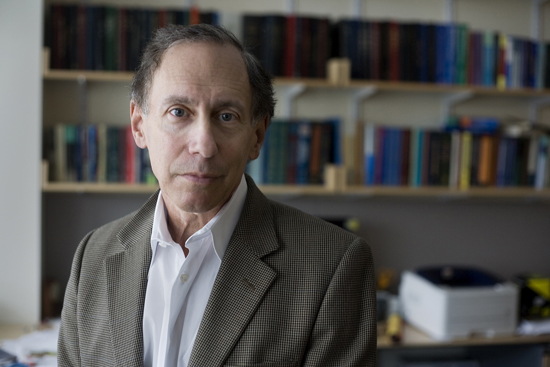MIT’s Robert Langer to Receive Honorary Degree
Prolific thinker will speak at ENG Convocation

Robert Langer’s lab is a model for innovators hoping to transform academic research into commercial success. Photo by M. Scott Brauer
Every company starts with an idea, and ideas come in extraordinary abundance to Robert Langer. His ideas have laid the foundations of at least 25 companies, and patents for technologies developed in his Langer Lab are licensed to more than 250 companies. Langer, the David H. Koch Institute Professor at MIT, will receive an honorary Doctor of Science at Boston University’s 140th Commencement on May 19 and will be the College of Engineering Convocation speaker on Saturday, May 18.
“I’m thrilled to receive an honorary degree from Boston University,” says Langer. “I’m also delighted that I will be giving a commencement address to this year’s engineering graduates.”
Most of the technologies and products that emerge from the Langer Lab are drugs and drug delivery systems that treat a wide range of medical problems, including diabetes, heart disease, schizophrenia, and cancer. Langer has developed many life-saving technologies, including transdermal delivery systems, and he has found new ways to grow tissue and organs, using polymer systems for tissue engineering.
The Langer Lab itself has become a model for innovators around the world hoping to transform academic research into commercial success. Terry McGuire, a cofounder of Polaris Partners, a venture capital firm that has invested $220 million in the lab’s businesses, says Langer’s genius has improved the health of many millions of people.
Kenneth Lutchen, dean of ENG, says Langer is perhaps the world’s most renowned person working in biomedical engineering.
“He is the consummate multidisciplinary engineer synthesizing materials science with biomedical, chemical, electrical, and mechanical engineering,” Lutchen notes. “More extraordinary is his vision and capacity to see and implement the pipeline of innovation from basic to applied to translational research all the way to product development and deployment, all for fundamentally challenging applications ranging from medicine to hair products. In that regard he is a sensational societal engineer, one with a never-ending passion to use his engineering foundations to advance our quality of life.” Societal engineers is a phrase coined by Lutchen that refers to a new generation of students who want to create products with a socially responsible eye.
Langer has received more than 220 major awards, among them the 2006 United States National Medal of Science and the 2011 United States National Medal of Technology and Innovation, the 2002 Charles Stark Draper Prize, the 2008 Millennium Prize, the world’s largest technology prize, the 2012 Priestley Medal, the highest award of the American Chemical Society, and the 2013 Wolf Prize in Chemistry. Time magazine and CNN have named Langer as one of the 100 most important people in America and one of the 18 top people in science or medicine in America.
Langer graduated from Cornell University and the Massachusetts Institute of Technology. After earning a doctorate in chemical engineering at MIT, he spent three years as a postdoctoral fellow in cancer research at Boston Children’s Hospital. He has written more than 1,200 articles, which have been cited in the scientific literature more than 80,000 times. He has 815 issued and pending patents worldwide, which have been licensed or sublicensed to more than 250 pharmaceutical, chemical, biotechnology, and medical device companies.
In 1989, Langer was elected to the Institute of Medicine of the National Academies, and in 1992 he was elected to both the National Academy of Engineering and the National Academy of Sciences. He is one of very few people who have been elected to all three of the National Academies and the youngest in history, at 43, to receive this distinction.
More information about Commencement can be found on the Commencement website.

Comments & Discussion
Boston University moderates comments to facilitate an informed, substantive, civil conversation. Abusive, profane, self-promotional, misleading, incoherent or off-topic comments will be rejected. Moderators are staffed during regular business hours (EST) and can only accept comments written in English. Statistics or facts must include a citation or a link to the citation.